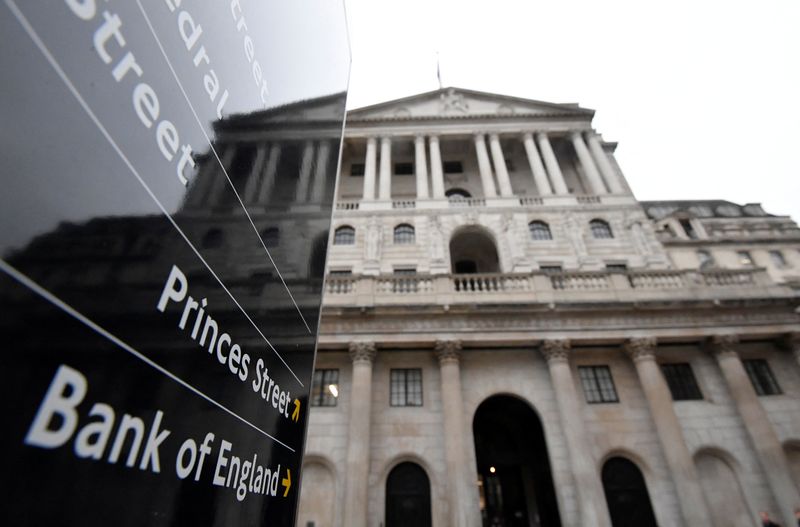By William Schomberg and David Milliken
LONDON (Reuters) -The Bank of England and Britain's new finance minister Kwasi Kwarteng will test their ability to jointly manage the economy next week, with the BoE set to raise interest rates to fight inflation and Kwarteng eyeing tax cuts which could stoke prices.
The seemingly opposing directions of monetary and fiscal policy underscore the economic challenges for Britain, which has the highest inflation rate among the world's big rich countries but is also at risk of slipping into a recession.
New Prime Minister Liz Truss campaigned for the Conservative Party leadership with a vow to reverse the "Treasury orthodoxy" which she blames for higher taxes and slower economic growth.
Now she and Kwarteng will have to find a way to deliver on those promises without pushing the BoE to raise interest rates so much that it worsens the economic slowdown.
On moving into Downing Street, Truss also announced a cap on energy prices that will help cushion the impact of soaring bills for households but will cost 100 billion pounds ($115 billion) - and possibly more - at a time when Britain's public finances are already stretched.
The cap means that inflation, which hit a 40-year high of 10.1% in July before edging down in August, will peak lower than it would have otherwise done, but the injection of money into consumers pockets is likely to keep it high for longer.
Ellie Henderson, an economist with Investec, said BoE Governor Andrew Bailey and his colleagues would be careful not to criticise government policy but would stick to their guns on countering inflationary risks.
"They will be cooling the economy at a time when the government, through its fiscal policy, is trying to stimulate demand," Henderson said. "There is divergence in the policy path but at the end of the day the BoE is independent and their main goal is price stability."
The BoE's chief economist, Huw Pill, told parliament last week that the central bank would counteract any medium-term inflation pressure created by government policy.
FASTER RATE RISES FORECAST
Investors have responded to Britain's big dose of fiscal stimulus by raising their inflation expectations and their bets on BoE interest rates.
British government bonds have fallen sharply and sterling hit nearly 40-year lows against the dollar this month, while investors bet on the BoE more than doubling rates to 4.5% by the middle of next year.
It looks set to raise borrowing costs for the seventh time since December on Thursday, with investors questioning only the size of the increase - another half-percentage-point rise or an even bigger 75 basis-point increase.
The next day, Kwarteng will deliver his first fiscal statement, government sources say, which will meet Truss's promise to reverse April's increase in social security contributions and a planned corporation tax rise.
However, full economic and fiscal forecasts will not come until the annual budget due later in the year.
Julian Jessop, an economist who provided informal advice to the Truss campaign, said he did not see a problem with interest rates going up and taxes being cut almost simultaneously.
"Fiscal policy has been too tight and monetary policy has been too loose. A bit of balancing is not a bad thing," he said.
"We need to get interest rates back to more sensible and sustainable levels. If we get there a couple of meetings earlier, that's a reasonable trade-off for avoiding a massive recession."
George Buckley, an economist with Nomura, said Kwarteng had shown he was aware of the risk of uncoordinated policies by scheduling twice-weekly meetings with BoE Governor Andrew Bailey as one of his first moves on taking over as finance minister.
"The Bank of England always has to accept what the Treasury does and make a decision on the back of it. So it is not inconsistent," Buckley said.

"Even if there might be one part of government loosening policy, and another tightening, at least one hand is talking to the other."
($1 = 0.8701 pounds)